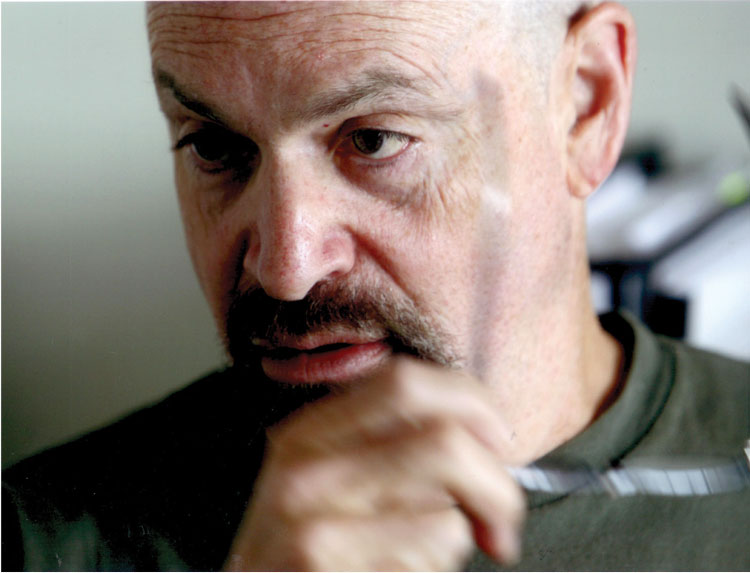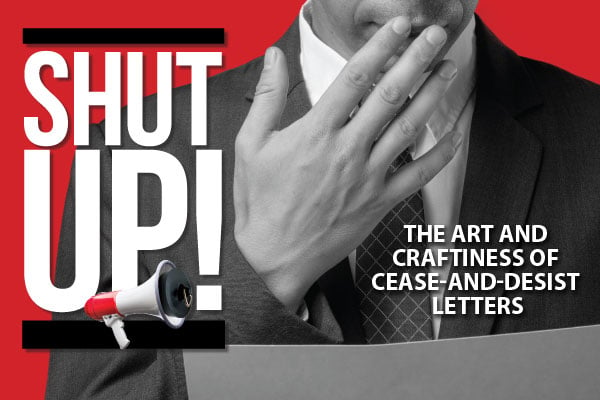Shut up! The art and craftiness of cease-and-desist letters
honey and humor

Richard Zitrin: “The internet has a lot of negative impact as far as privacy is concerned, but this is one area where we want transparency.” Photograph courtesy of Richard Zitrin.
An effective demand letter gets things done—in the watchwords of modern business efficiency: faster, better, cheaper.
Writing effective demand letters is both art and craft. And while nastiness seems on the increase—perhaps simply reflecting society in general—so has a kinder, gentler approach, for good reason.
Some corporate law offices have come up with creative ways to get the job done and, most importantly, avoid the Streisand effect. A wrong move might go viral, even to the point of boycotts of products or services.
Last December, Anheuser-Busch crafted an entertaining approach to protect its catchphrase “Dilly Dilly,” in a monthslong series of Bud Light TV ads leading up to a finale during the Super Bowl. The ads showed a king, queen and courtiers in medieval garb hoisting bottles of the beer given to the royals by their subjects and calling out “Dilly Dilly” to show appreciation.
One supplicant then offered “a spiced-honey mead wine.” At the king’s whim, the jailer took him away for “a private tour of the Pit of Misery.”

Elizabeth McNamara: “The fact that Mr. Trump would spend time during the week of the Republican National Convention focused on settling a score with and trying to censor his co-author on a 30-year-old book is, frankly, baffling.” Photograph courtesy of Davis Wright Tremaine.
Anheuser-Busch sent a similarly clothed town crier to a Minneapolis pub that had recently launched its own “Dilly Dilly Mosaic” India pale ale.
The crier read from a scroll: “Dear friend of the Crown, Modist Brewing Co. Congratulations on the launch of your new brew, Dilly Dilly Mosaic Double IPA! Let it be known that we believe that any beer that is shared between friends is a fine beer indeed. And we are duly flattered by your loyal tribute. However, ‘Dilly Dilly’ is the motto of our realm, so we humbly ask that you keep this to a limited-edition, one-time-only run. This is by order of the king. Disobedience shall be met with additional scrolls, then a formal warning and, finally, a private tour of the Pit of Misery. Please send a raven, letter or electronic mail to let us know that you agree to this request. Also, we will be in your fair citadel of Minneapolis for the Super Bowl and would love to offer two thrones to said game for two of your finest employees to watch the festivities and enjoy a few Bud Lights.”
And thus the tale ended.
But the aggressive, all-or-nothing-style gambit still rules. A number of lawyers representing Donald Trump, as candidate and president, have issued tough demand letters. These include ones to silence adult film actress Stormy Daniels, whose given name is Stephanie Clifford; Tony Schwartz, who wrote (technically co-authored) the 1987 book Trump: The Art of the Deal, and who made the media rounds more recently as a Trump critic; and the publication of Michael Wolff’s gossipy, revelatory and detailed book Fire and Fury.
Those missives triggered the Streisand effect: Daniels came to be seen by many as the adult in the bedroom, and Trump, in an extended train of legal filings, in effect admitted the assignations with her. Wolff moved many more books and made bigger money than he otherwise would have. Schwartz got an Energizer Bunny boost with continued invitations to offer his insights to the public.
Although actual surgeons carefully avoid damaging major nerves, in 2016 Schwartz’s lawyer—Elizabeth McNamara, a media and intellectual property law specialist and partner in the New York City office of Davis Wright Tremaine—deliberately rubbed the edge of her serrated scalpel along one in response to a demand letter from Jason D. Greenblatt, then chief legal officer for the Trump Organization, after first schooling him on defamation law.
“The fact that Mr. Trump would spend time during the week of the Republican National Convention focused on settling a score with and trying to censor his co-author on a 30-year-old book is, frankly, baffling, but only further underscores the very basis for Mr. Schwartz’s criticisms,” she wrote.
This all played out in the worldwide openness of the internet.
No more secrets
Richard Zitrin, who teaches legal ethics at the University of California’s Hastings College of the Law in San Francisco, says it’s harder to bury things now. “Years ago, the Stormy Daniels story would’ve been much less likely to come out. Now it’s on every Page One, including the New York Times,” he says.
“The internet has a lot of negative impact as far as privacy is concerned, but this is one area where we want transparency. It’s helping to create more accountability among the rich and famous,” he adds.
But the role of lawyers in efforts to avoid accountability is troubling to Rebecca Roiphe, who teaches professionalism at the New York Law School and who took up study of the history of the legal profession after getting a doctorate in American history at the University of Chicago and a law degree at Harvard.
Roiphe laments the demise of professionalism, as status comes through reputation rather than wealth, with an ability to go beyond self-interest and pursue the public good. Now, she says, wealth is the main goal, rather than a byproduct of professional endeavors. Thus the rise in recent decades of a simple market concept as the core of the practice of law—the delivery of legal services.
“We’re currently living in a world where people are so much more disrespectful of facts and truth than they used to be,” Roiphe says. “It seems more important now that facts come out, and lawyers are contributing to the truth being buried. There are agreements where people are paid not to come forward. It’s all about keeping facts quiet, and that’s problematic to me from an ethical perspective.”
Barring significant objections on ethical or professional conduct grounds, aggressive demand letters, threats and money will hold their purchase. But the Streisand effect and resulting efforts to minimize such repercussions with less strident persuasive techniques can only grow in reach and impact.
As Singer, the master of demands, put it once in an interview for “The Tricky Science of the Nasty Letter,” a story in the Hollywood Reporter: “When you’re sending something to the media, you’ve got to be concerned that whatever you say will be coming out.”




